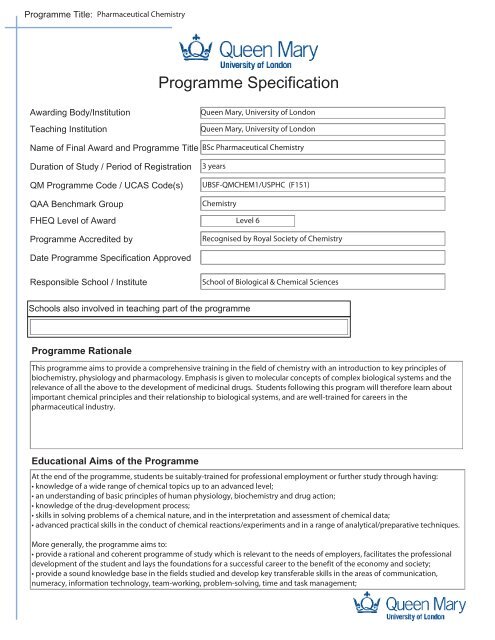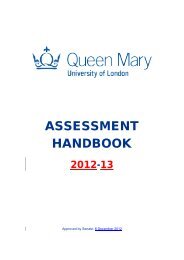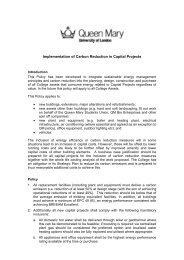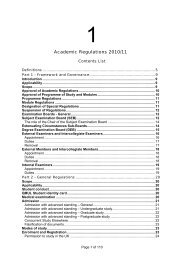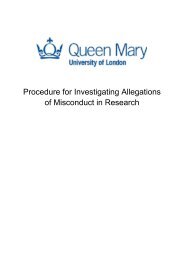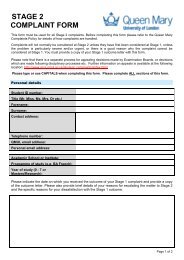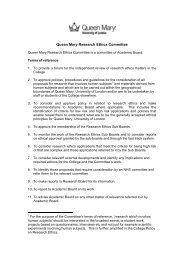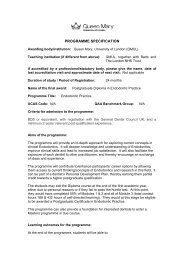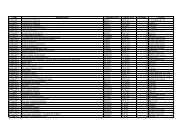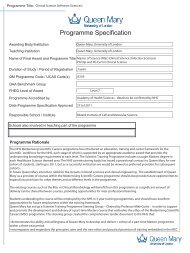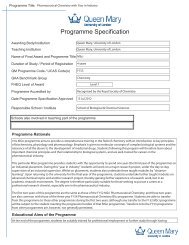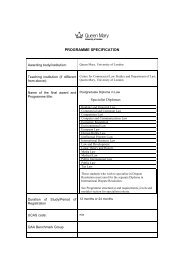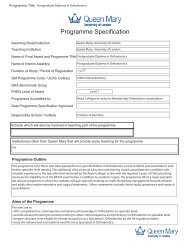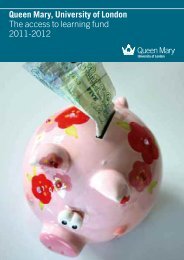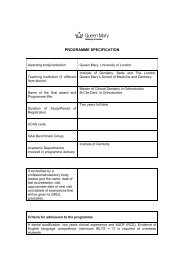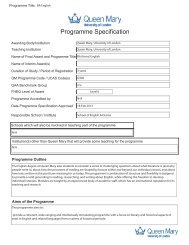Programme Specification - Queen Mary, University of London
Programme Specification - Queen Mary, University of London
Programme Specification - Queen Mary, University of London
Create successful ePaper yourself
Turn your PDF publications into a flip-book with our unique Google optimized e-Paper software.
<strong>Programme</strong> Title: Pharmaceutical Chemistry<br />
<strong>Programme</strong> <strong>Specification</strong><br />
Awarding Body/Institution<br />
Teaching Institution<br />
<strong>Queen</strong> <strong>Mary</strong>, <strong>University</strong> <strong>of</strong> <strong>London</strong><br />
<strong>Queen</strong> <strong>Mary</strong>, <strong>University</strong> <strong>of</strong> <strong>London</strong><br />
Name <strong>of</strong> Final Award and <strong>Programme</strong> Title BSc Pharmaceutical Chemistry<br />
Duration <strong>of</strong> Study / Period <strong>of</strong> Registration<br />
QM <strong>Programme</strong> Code / UCAS Code(s)<br />
QAA Benchmark Group<br />
3 years<br />
UBSF-QMCHEM1/USPHC (F151)<br />
Chemistry<br />
FHEQ Level <strong>of</strong> Award Level 6<br />
<strong>Programme</strong> Accredited by<br />
Recognised by Royal Society <strong>of</strong> Chemistry<br />
Date <strong>Programme</strong> <strong>Specification</strong> Approved<br />
Responsible School / Institute<br />
School <strong>of</strong> Biological & Chemical Sciences<br />
Schools also involved in teaching part <strong>of</strong> the programme<br />
<strong>Programme</strong> Rationale<br />
This programme aims to provide a comprehensive training in the field <strong>of</strong> chemistry with an introduction to key principles <strong>of</strong><br />
biochemistry, physiology and pharmacology. Emphasis is given to molecular concepts <strong>of</strong> complex biological systems and the<br />
relevance <strong>of</strong> all the above to the development <strong>of</strong> medicinal drugs. Students following this program will therefore learn about<br />
important chemical principles and their relationship to biological systems, and are well-trained for careers in the<br />
pharmaceutical industry.<br />
Educational Aims <strong>of</strong> the <strong>Programme</strong><br />
At the end <strong>of</strong> the programme, students be suitably-trained for pr<strong>of</strong>essional employment or further study through having:<br />
• knowledge <strong>of</strong> a wide range <strong>of</strong> chemical topics up to an advanced level;<br />
• an understanding <strong>of</strong> basic principles <strong>of</strong> human physiology, biochemistry and drug action;<br />
• knowledge <strong>of</strong> the drug-development process;<br />
• skills in solving problems <strong>of</strong> a chemical nature, and in the interpretation and assessment <strong>of</strong> chemical data;<br />
• advanced practical skills in the conduct <strong>of</strong> chemical reactions/experiments and in a range <strong>of</strong> analytical/preparative techniques.<br />
More generally, the programme aims to:<br />
• provide a rational and coherent programme <strong>of</strong> study which is relevant to the needs <strong>of</strong> employers, facilitates the pr<strong>of</strong>essional<br />
development <strong>of</strong> the student and lays the foundations for a successful career to the benefit <strong>of</strong> the economy and society;<br />
• provide a sound knowledge base in the fields studied and develop key transferable skills in the areas <strong>of</strong> communication,<br />
numeracy, information technology, team-working, problem-solving, time and task management;
<strong>Programme</strong> Title: Pharmaceutical Chemistry<br />
• foster the development <strong>of</strong> an enquiring, open-minded and creative attitude, tempered with scientific discipline and social<br />
awareness, which encourages lifelong learning.<br />
Learning Outcomes<br />
The programme provides opportunities for students to develop and demonstrate knowledge and understanding,<br />
skills and other attributes in the following areas. The programme outcomes are referenced to the relevant QAA<br />
benchmark statement(s) (see above) and the Framework for Higher Education Qualifications in England, Wales<br />
and Northern Ireland (2008), and relate to the typical student. Additionally, the SEEC Credit Level Descriptors<br />
for Further and Higher Education 2003 and <strong>Queen</strong> <strong>Mary</strong> Statement <strong>of</strong> Graduate Attributes have been used as a<br />
guiding framework for curriculum design.<br />
Knowledge and understanding <strong>of</strong>:<br />
A 1<br />
A 2<br />
A 3<br />
Basic essential facts, fundamental concepts, principles and theories <strong>of</strong> chemistry and pharmacology.<br />
Facts, concepts, principles and theories at an advanced level across a wide range <strong>of</strong> chemical topics, typically<br />
including the following areas:<br />
Organic Chemistry: including organic structures and functional groups, stereochemistry, reactions and mechanisms,<br />
molecular synthesis, biological aspects <strong>of</strong> organic chemistry.<br />
Inorganic Chemistry: including structure and bonding, chemistry <strong>of</strong> selected elements, solid-state chemistry, metal<br />
complexes and organometallics, applications <strong>of</strong> inorganic chemistry.<br />
Physical Chemistry: including chemical thermodynamics and kinetics, quantum theory and molecular bonding,<br />
spectroscopic techniques, interfaces and solution chemistry.<br />
Topics in pharmacology: including drug targets; mode <strong>of</strong> action and metabolism; pharmacokinetics; cancer<br />
chemotherapy; structure-activity relationships and methods <strong>of</strong> drug discovery.<br />
Intellectual skills - able to:<br />
B 1<br />
B 2<br />
B 3<br />
B 4<br />
B 5<br />
B 6<br />
Reason critically<br />
Integrate theory and practice<br />
Identify and formulate problems<br />
Apply principles to the solution <strong>of</strong> problems<br />
Analyse and evaluate/interpret the results <strong>of</strong> controlled experiments<br />
Devise strategies for the retrieval and selection <strong>of</strong> relevant information from a wide range <strong>of</strong> sources<br />
Transferable skills - able to:<br />
C 1<br />
C 2<br />
Communicate effectively by written and/or verbal means<br />
Manage time, prioritise workloads and work to deadlines
<strong>Programme</strong> Title: Pharmaceutical Chemistry<br />
C 3<br />
C 4<br />
C 5<br />
C 6<br />
C 7<br />
C 8<br />
Learn independently, using a range <strong>of</strong> learning resources<br />
Participate constructively as a member <strong>of</strong> a group/team<br />
Apply mathematical skills and problem solving skills in a wide range <strong>of</strong> theoretical and practical situations<br />
Assess the relevance, importance and reliability <strong>of</strong> the ideas <strong>of</strong> others<br />
Use IT/computer-based technology to locate information and to analyse, manipulate and present data<br />
Explain and discuss the role and impact <strong>of</strong> science in society<br />
Practical skills - able to:<br />
D 1<br />
D 2<br />
D 3<br />
D 4<br />
D 5<br />
D 6<br />
D 7<br />
D 8<br />
D 9<br />
Plan and conduct laboratory-based practical work, efficiently and with due regard for safety<br />
Use a wide range <strong>of</strong> laboratory and analytical equipment<br />
Retrieve, filter and collate chemical data from a variety <strong>of</strong> information sources<br />
Prepare scientific/technical reports <strong>of</strong> an appropriate pr<strong>of</strong>essional standard<br />
Use a range <strong>of</strong> scientific s<strong>of</strong>tware and computational tools<br />
Use advanced theories and concepts to explain chemical phenomena<br />
Apply mathematical knowledge and skills to the solution <strong>of</strong> a wide range <strong>of</strong> problems<br />
Plan, undertake and report a bibliographically-based piece <strong>of</strong> research<br />
Assemble and deliver oral presentations on assigned topics and project work<br />
Teaching, Learning and Assessment Strategies<br />
A. Knowledge and understanding<br />
Teaching/learning methods and strategies<br />
Acquisition <strong>of</strong> knowledge is achieved mainly through lectures and, in some cases, directed independent learning. Understanding<br />
is reinforced through a combination <strong>of</strong> tutorial workshops, problem classes and laboratory classes (depending upon the module<br />
concerned), including regular feedback on submitted work. Additional support is provided through the individual module<br />
webpages and the facilities <strong>of</strong> the QMUL Student PC Service.<br />
Assessment<br />
Testing <strong>of</strong> the knowledge base is generally through a combination <strong>of</strong> unseen written examinations and assessed coursework.<br />
The exact nature <strong>of</strong> the coursework varies from module to module and may include work in the form <strong>of</strong> laboratory experiment<br />
reports, essays and/or problem sheets. The coursework mark may also include a contribution from computer-based assessments<br />
and in-course tests. Specific modules (if taken) include assessed oral examinations, oral presentations and extended reports/<br />
dissertations.<br />
B. Intellectual skills
<strong>Programme</strong> Title: Pharmaceutical Chemistry<br />
Teaching/learning methods and strategies<br />
Intellectual skills are developed throughout the teaching and learning programme outlined in the following section.<br />
Analysis and problem-solving skills (3-4) are developed, in particular, through problem/example classes and tutorial workshops,<br />
whilst practical classes <strong>of</strong>fer the opportunity to integrate skills (2) and improve those relating to analysis and interpretation (5).<br />
Project work <strong>of</strong>fers students the opportunity to demonstrate achievement in skills 1 and 6.<br />
Assessment<br />
Intellectual skills 1-4 are partly assessed by formal examination, but the main vehicle <strong>of</strong> assessment for all skills is coursework<br />
(especially problem sheets, practical laboratory reports and project dissertations).<br />
C. Transferable skills<br />
Teaching/learning methods and strategies<br />
Transferable skills are developed in a contextual manner throughout the teaching and learning programme outlined in the<br />
following section. Specific skills are developed further in particular modules (e.g. the Project Skills for Chemists module).<br />
Assessment<br />
Many <strong>of</strong> the transferable skills (e.g. 1, 2, 3, 6, 7) are indirectly assessed as part <strong>of</strong> the normal assessment processes for the<br />
programme.<br />
D. Pr<strong>of</strong>essional practical skills<br />
Teaching/learning methods and strategies<br />
Chemistry practical skills (1-5) are developed in a progressive manner throughout the programme. In the lower levels attention is<br />
concentrated on the basic skills and safe working practice, while at higher levels more advanced techniques and non-prescribed<br />
exercises are introduced.<br />
Skills in the application <strong>of</strong> chemical theories and concepts (6) and mathematical knowledge (7) are developed by a progression <strong>of</strong><br />
graded problem classes and tutorial exercises.<br />
Training in other skills (8, 9) is provided through the provision <strong>of</strong> primers/guidance notes.<br />
Assessment<br />
Chemistry practical skills and report-writing skills (1-5) are assessed through written laboratory reports, which include attention<br />
to quantitative accuracy. Skills 6,7 are assessed through a combination <strong>of</strong> coursework and formal written examination. Skills 8,9<br />
are assessed as part <strong>of</strong> the coursework <strong>of</strong> specific modules.<br />
<strong>Programme</strong> Structure(s) and Requirements, Levels and Modules<br />
Students are required to register for modules to a value <strong>of</strong> 120 credits in each academic year; this should normally consist <strong>of</strong> 60<br />
credits in each semester.<br />
YEAR 1<br />
Compulsory modules (120 credits in total):<br />
CHE100 Essential Skills for Chemists (15 credits, level 4, sem A+B)<br />
CHE111 Atomic, Molecular and Ionic Structure (15 credits, level 4, sem A)<br />
CHE121 Foundations <strong>of</strong> Organic Chemistry (15 credits, level 4, sem A)<br />
CHE135 Elements <strong>of</strong> Physical Chemistry (15 credits, level 4, sem A)<br />
SBS008 Heredity and Gene Action (15 credits, level 4, sem A)<br />
CHE222 Organic Functional Group Chemistry (15 credits, level 4, sem B)<br />
CHE242 Kinetics and Coordination Chemistry (15 credits, level 4, sem B)<br />
SBS017 Basic Biochemistry (15 credits, level 4, sem B)<br />
YEAR 2<br />
Compulsory modules (120 credits in total):<br />
CHE322 Constructing Organic Molecules (15 credits, level 5, sem A)<br />
CHE361 Introduction to Drug Action (15 credits, level 5, sem A)<br />
SBC920 Techniques for the Biological & Chemical Sciences (15 credits, level 5, sem A)
<strong>Programme</strong> Title: Pharmaceutical Chemistry<br />
SBS501 Animal Physiology (15 credits, level 5, sem A)<br />
CHE312 Transition Metal Chemistry (15 credits, level 5, sem B)<br />
CHE422 Chemistry <strong>of</strong> Biological Molecules (15 credits, level 5, sem B)<br />
CHE461 Chemical Pharmacology (15 credits, level 5, sem B)<br />
SBC510 Molecules from First Principles (15 credits, level 5, sem B)<br />
YEAR 3<br />
Compulsory modules (90 credits in total):<br />
CHE010 Advanced Experimental Chemistry (15 credits, level 6, sem A)*<br />
CHE512 Contemporary Inorganic Chemistry (15 credits, level 6, sem A)<br />
CHE561 Cancer Chemotherapy (15 credits, level 6, sem A)<br />
SBC601 Topics in Biological Chemistry (15 credits, level 6, sem B)<br />
SBC702 Molecules and Ions at Interfaces (15 credits, level 6, sem B)<br />
SBC703 Synthesis <strong>of</strong> Pharmaceutically Active Molecules (15 credits, level 6, sem A)<br />
Plus 30 credits from the following:<br />
SBC605 Project Skills in Chemistry (30 credits, level 6, sem A+B)<br />
CHE900 Chemistry Project (30 credits, level 6, sem A+B)**<br />
* the first part <strong>of</strong> this module generally runs after the completion <strong>of</strong> second-year examinations<br />
** subject to students meeting the minimum academic conditions for registration for this module<br />
Module Title<br />
Module<br />
Code<br />
Credits<br />
Level<br />
Module<br />
Selection<br />
Status<br />
Academic<br />
Year <strong>of</strong><br />
Study<br />
Semester<br />
X<br />
Criteria for Admission to the <strong>Programme</strong><br />
Candidates must be able to satisfy the general admissions requirements <strong>of</strong> the <strong>University</strong> and meet the requirements for this<br />
specific programme <strong>of</strong> study. This is usually achieved in one <strong>of</strong> the following ways (although the entry-points tariff is subject to<br />
annual review):<br />
For direct entry to the degree programme, candidates must usually possess a minimum total <strong>of</strong> 300 points on the UCAS points<br />
tariff system, including a minimum <strong>of</strong> a grade B in 'A2' Chemistry or an equivalent qualification. Mathematics at AS-level or<br />
higher is strongly recommended.<br />
or via<br />
Admission to the QMUL Science and Engineering Foundation <strong>Programme</strong> (SEFP), and successful completion <strong>of</strong> the foundation<br />
year (defined by achievement <strong>of</strong> the minimum requirements for progression defined in the SEFP programme regulations, and<br />
the criteria specified in the SEFP Student Handbook for progression to this particular degree programme).<br />
Quality Assurance Mechanism<br />
Include details <strong>of</strong>: SSLC meetings, student feedback mechanisms, personal tutor arrangements, programme<br />
induction, programme review and monitoring.<br />
<strong>Programme</strong> reviews are undertaken by the programme co-ordinator, who reports back to the Chemistry Teaching Group, and the<br />
SBCS Teaching & Learning Committee (TLC). These reviews are based on:<br />
• reviews <strong>of</strong> individual modules.<br />
• external examiner reports.<br />
• feedback from (and actions initiated by) the TLC.<br />
• requirements <strong>of</strong> pr<strong>of</strong>essional and accrediting bodies (especially the Royal Society <strong>of</strong> Chemistry).
<strong>Programme</strong> Title: Pharmaceutical Chemistry<br />
Committees with responsibility for monitoring and evaluating quality and standards are:<br />
• SBCS Teaching & Learning Committee (TLC)<br />
• Biological & Chemical Sciences Examination Board (BCSEB).<br />
• QMUL Science Degree Examination Board (DEB).<br />
• QMUL Quality Enhancement Committee (QEC).<br />
Mechanisms for monitoring and improving quality <strong>of</strong> individual staff teaching<br />
Newly appointed staff are usually expected to have a PhD level <strong>of</strong> qualification (or equivalent levels <strong>of</strong> qualification and<br />
experience), and to undertake training in academic practice in accord with the requirements <strong>of</strong> <strong>Queen</strong> <strong>Mary</strong>, <strong>University</strong> <strong>of</strong><br />
<strong>London</strong>. For all staff, feedback on performance (and monitoring there<strong>of</strong>) is provided by:<br />
• module feedback questionnaires<br />
• the staff appraisal scheme<br />
• peer observation <strong>of</strong> teaching.<br />
Further opportunities for staff development are provided by The Learning Institute <strong>of</strong> QMUL .<br />
Mechanisms for gaining student feedback on the quality <strong>of</strong> teaching and their learning experience:<br />
• SBCS Student Staff Liaison Committee<br />
• module feedback questionnaires<br />
Further informal feedback is obtained through contact with students in laboratory and tutorial classes, and through meetings<br />
with student advisees.<br />
The Induction <strong>Programme</strong> for new students includes:<br />
• briefings from senior staff on matters relating to general study<br />
• briefings on the conduct <strong>of</strong> chemistry practicals and laboratory matters<br />
• an introduction to Library Services<br />
The tutoring/advising arrangements include:<br />
• appointment <strong>of</strong> a personal tutor for each individual student for the duration <strong>of</strong> their studies<br />
• a Senior Academic Advisor, with overall responsibility for student welfare, who is also able to provide advice in the absence <strong>of</strong><br />
the personal tutor.<br />
<strong>Programme</strong>-specific Assessment Regulations (if applicable)<br />
In the case <strong>of</strong> programmes that deviate / do not comply with the Academic Regulations further information<br />
regarding the nature <strong>of</strong> any difference and/or deviation should be stipulated in detail.<br />
Employers Links<br />
Please provide details <strong>of</strong> any links with employers e.g.<br />
· Details <strong>of</strong> advisory panels that include current or potential employers;<br />
· Organisations that regularly employ graduates from this programme and the roles that graduates<br />
undertake.<br />
· Student prizes donated by organisations that may <strong>of</strong>fer employment to graduates from this programme.<br />
If there are no links with employers consider the learning outcomes and transferable skills and explain how<br />
these might be used to inform employers about the qualities and skills a graduate from this programme might<br />
be expected to have.<br />
Chemistry is <strong>of</strong>ten regarded as the "central science", and interfaces with physics, biology, materials science and medicine. This<br />
three year degree, which is recognised by the Royal Society <strong>of</strong> Chemistry, <strong>of</strong>fers a high-level <strong>of</strong> training in both practical and<br />
theoretical aspects <strong>of</strong> chemistry, suitable for those wishing to pursue a career as a pr<strong>of</strong>essional chemist. Graduates <strong>of</strong> the<br />
programme also possess knowledge <strong>of</strong> key aspects <strong>of</strong> biochemistry, physiology and pharmacology, which will be <strong>of</strong> use to those
<strong>Programme</strong> Title: Pharmaceutical Chemistry<br />
aiming to pursue careers working in the pharmaceutical industry or allied industries.<br />
Graduates <strong>of</strong> chemistry degree courses are generally recognised by employers as having good technical and transferable skills:<br />
including skills in literacy, numeracy, application <strong>of</strong> logic, problem solving, communication, IT and computation, independent<br />
and team working, and time management.<br />
Opportunities for employment within the field <strong>of</strong> chemistry would include careers in the following areas:<br />
chemical industry; pharmaceuticals; food industry; mining, oil and gas industries; consumer products (e.g. cosmetics); analytical<br />
and forensic services; teaching and education; environmental protection.<br />
Opportunities for employment outside the field <strong>of</strong> chemistry would include careers in the following areas:<br />
finance; commerce; civil service; law; journalism; publishing; healthcare; technical sales; information technology.<br />
<strong>Programme</strong> <strong>Specification</strong> Approval<br />
Person completing <strong>Programme</strong> <strong>Specification</strong><br />
Dr P B Wyatt<br />
Person responsible for management <strong>of</strong> programme Dr P B Wyatt<br />
Date <strong>Programme</strong> <strong>Specification</strong> produced/amended<br />
by School or teaching and learning committee<br />
17 Dec 2010<br />
Date <strong>Programme</strong> <strong>Specification</strong> approved by<br />
<strong>Programme</strong> and Module approval Board
Table 1: Development <strong>of</strong> <strong>Programme</strong> Learning Outcomes in the Core Constituent Modules<br />
This map identifies where the programme learning outcomes are assessed in the core constituent modules. It provides (i) an aid to academic staff in<br />
understanding how individual modules contribute to the programme aims (ii) a checklist for quality control purposes and (iii) a means to help students<br />
monitor their own learning, personal and pr<strong>of</strong>essional development as the programme progresses. For each core module, indicate the programme<br />
learning outcomes that they are associated with a 'tick' in the relevant box(es). Core modules must be passed in order to meet award regulations.<br />
Learning Outcome Type: K & U K & U K & U K & U I Skills I Skills I Skills I Skills T Skills T Skills T Skills P Skills P Skills<br />
Learning Outcome Reference (A1, B1, C1, D1) A1 A2 A3 A4 B1 B2 B3 B4 C1 C2 C3 D1 D2<br />
Title <strong>of</strong> Core Module<br />
Module<br />
Code
Key<br />
A Learning Outcome which is assessed as part <strong>of</strong> the module is denoted by a 'tick' in the above table.<br />
K & U = Knowledge & Understanding<br />
I Skills = Intellectual Skills<br />
T Skills - Transferable Skills<br />
P Skills = Practical Skills


